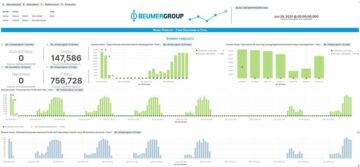Circular economic designs are essential to reclaim plastics for reuse in our supply chains. The logistics of these circular supply chain designs will require more decisions to be made faster using more intelligence so that our economies generate value while minimizing the impacts on natural resources.
The pace of our digital world is leading to more logistics decisions and AI-powered data and intelligence to ensure optimal decisions that consider and operationalize sustainability.
Sustainability Goals are Affecting Logistics Decisions
Logistică inversă: Sustainable logistics encompasses the movement of goods from suppliers to customers and the management of returns and recycling processes. Implementing efficient reverse logistics systems ensures that products and materials are reused or recycled whenever possible, reducing waste and environmental impact.
Optimizarea lanțului de aprovizionare: Sustainability goals often require companies to rethink their supply chains to reduce environmental impact. This may involve sourcing materials locally to reduce transportation emissions, optimizing routes to minimize fuel consumption, or consolidating shipments to reduce the number of trucks on the road.
Transport alternativ: Logistics operations increasingly turn to alternative transportation methods such as electric vehicles, hybrid trucks, or even bicycles for last-mile delivery to reduce reliance on fossil fuels and minimize emissions.
Data Analytics and Technology: Sustainable logistics relies heavily on data analytics and technology to monitor and optimize operations continually. By leveraging data on transportation routes, fuel consumption, and emissions, companies can identify areas for improvement and implement strategies to reduce their environmental footprint.
Respectarea reglementărilor: With governments worldwide implementing stricter environmental regulations, companies need to ensure their logistics operations comply with these regulations. This may involve reducing carbon emissions, minimizing waste, or adhering to specific standards for transportation and packaging.
Colaborare și parteneriate: Achieving sustainability goals often requires collaboration among various stakeholders in the supply chain. Companies may partner with suppliers, customers, and logistics providers to develop and implement sustainable practices collectively, sharing resources and knowledge to drive positive environmental outcomes.
Sustainable Logistics Drives the Need for Decision Intelligence
Overall, sustainability goals drive significant changes in logistics practices, pushing companies to adopt more environmentally-friendly strategies and embrace innovation to create a more sustainable future.
Logistics management teams will be faced with more decisions to make than ever before — with much less time to make them and greater consequences.
This is where decision intelligence adds value.
Decision intelligence, which uses the power of AI and machine learning to digitize, augment, and automate decision-making, generates outcomes for a wide range of industry sectors. Delivered through AI decision automation, it provides the decision agility and scale required to address the increasing complexity of business and manage disruptions and costs that traditional approaches to logistics are struggling to address.
The technology can connect to internal and external data sources, operate in real-time and continually analyze the logistics management environment to identify the best course of action. It uses real-time data to trigger logistics events, adapt logistics routes and modes to balance sustainability, cost, and service requirements, and even predict potential stockouts. This not only improves efficiencies but also builds institutional knowledge to empower teams.
Decision Intelligence provides the ultimate framework for responding to these telescopic sustainability changes to logistics goals through better, faster decision-making.
Decision Intelligence and Plastic Waste
Decision intelligence can play a critical role in reclaiming plastics for reuse and improving the circularity index of the supply chain.
By automatically maintaining analytics on each of the qualified plastics material vendors in the supply chain, sourcing decisions can be made that improve circularity by volume, brand, country, and other factors that can be tracked to specified targets.
The value of the decisions can then be monitored to ensure that projected increases in circularity are realized. Decision intelligence systems can also learn from each action and provide improved confidence in plastic reduction or overall sustainability goals.
Achieving Logistics Sustainability Using Decision Intelligence
Improving logistics decisions to support sustainability is only achievable through transformative decision intelligence technologies that improve and accelerate decisions—and teams willing to test and learn to drive their adoption.
Logistics leaders prioritizing decision intelligence are realizing amazing outcomes. To learn more, visit www.aeratechnology.com
Autorul Bio
Matthew Bunce, Decision Intelligence Engagement Principal at Aera Technology, is a supply chain technology and management consultant for Fortune 500 companies. Certified in Sustainability and Design for the Circular Economy (Cambridge), his expertise includes implementing strategic digital transformation initiatives that document current and future state business processes, define how value will be realized, and validate that business results are achieved.
Header Image: Aera Technology
- Distribuție de conținut bazat pe SEO și PR. Amplifică-te astăzi.
- PlatoData.Network Vertical Generative Ai. Împuterniciți-vă. Accesați Aici.
- PlatoAiStream. Web3 Intelligence. Cunoștințe amplificate. Accesați Aici.
- PlatoESG. carbon, CleanTech, Energie, Mediu inconjurator, Solar, Managementul deșeurilor. Accesați Aici.
- PlatoHealth. Biotehnologie și Inteligență pentru studii clinice. Accesați Aici.
- Sursa: https://logisticsmatter.com/sustainability-goals-uncover-the-value-of-ai-for-logistics-decisions/
- :este
- :nu
- :Unde
- 1
- 14
- 500
- 800
- 9
- a
- accelera
- realizabil
- realizat
- Acțiune
- adapta
- adresa
- Adaugă
- aderare
- adopta
- Adoptare
- care afectează
- AI
- AI-alimentat
- de asemenea
- alternativă
- uimitor
- printre
- Google Analytics
- analiza
- și
- abordari
- SUNT
- domenii
- AS
- At
- spori
- automatizarea
- în mod automat
- Automatizare
- Sold
- BE
- înainte
- CEL MAI BUN
- Mai bine
- biciclete
- marca
- construiește
- afaceri
- procesele de afaceri
- dar
- by
- Cambridge
- CAN
- carbon
- emisiilor de carbon
- Certificate
- lanţ
- lanţuri
- Modificări
- circulară
- economiei circulare
- colaborare
- colectiv
- Companii
- complexitate
- conformitate
- se conforma
- încredere
- Conectați
- Consecințele
- Lua în considerare
- consolidarea
- consultant
- consum
- continuu
- A costat
- Cheltuieli
- ţară
- înscrie-te la cursul
- crea
- critic
- Curent
- clienţii care
- de date
- Analiza datelor
- decizie
- Luarea deciziilor
- Deciziile
- defini
- livrate
- livrare
- Amenajări
- modele
- dezvolta
- digital
- Transformarea digitală
- lume digitală
- situație computerizată
- perturbări
- document
- conduce
- unități
- fiecare
- Economic
- economii
- economie
- eficiență
- eficient
- electric
- vehicule electrice
- îmbrăţişare
- Emisiile
- împuternici
- , acoperă
- angajament
- asigura
- asigură
- Mediu inconjurator
- de mediu
- esenţial
- Chiar
- evenimente
- EVER
- expertiză
- extern
- cu care se confruntă
- factori
- mai repede
- urmă
- Pentru
- Avere
- fosil
- combustibili fosili
- Cadru
- din
- Combustibil
- combustibili
- viitor
- Gartner
- genera
- generează
- Goluri
- bunuri
- guvernele
- mai mare
- puternic
- lui
- Cum
- http
- HTTPS
- Hibrid
- identifica
- imagine
- Impactul
- Impacturi
- punerea în aplicare a
- Punere în aplicare a
- îmbunătăţi
- îmbunătățit
- îmbunătățire
- îmbunătăţeşte
- îmbunătățirea
- in
- include
- Creșteri
- crescând
- tot mai mult
- index
- industrie
- inițiative
- Inovaţie
- Instituţional
- Inteligență
- intern
- implica
- IT
- jpeg
- cunoştinţe
- Liderii
- conducere
- AFLAȚI
- învăţare
- mai puțin
- efectului de pârghie
- la nivel local
- logistică
- maşină
- masina de învățare
- făcut
- mentine
- face
- administra
- administrare
- echipe de conducere
- material
- Materiale
- Matthew
- Mai..
- Metode
- minimaliza
- minimizând
- moduri de
- monitor
- monitorizate
- mai mult
- mişcare
- mult
- Natural
- Nevoie
- număr
- of
- de multe ori
- on
- afară
- funcionar
- Operațiuni
- optimă
- optimizare
- Optimizați
- optimizarea
- or
- Altele
- al nostru
- rezultate
- global
- Pace
- ambalaje
- partener
- parteneriate
- plastic
- materiale plastice
- Plato
- Informații despre date Platon
- PlatoData
- Joaca
- pozitiv
- posibil
- potenţial
- putere
- practicile
- prezice
- Principal
- Stabilirea priorităților
- procese
- Produse
- proiectat
- furniza
- furnizori
- furnizează
- împingerea
- calificat
- gamă
- în timp real
- date în timp real
- realizat
- realizarea
- reciclate
- reciclare
- reduce
- reducerea
- reducere
- regulament
- încredere
- se bazează
- necesita
- necesar
- Cerinţe
- Necesită
- Resurse
- răspunde
- REZULTATE
- Returnează
- reutilizarea
- reutilizate
- inversa
- drum
- Rol
- rute
- Scară
- sectoare
- serviciu
- partajarea
- semnificativ
- So
- Surse
- Sourcing
- specific
- specificată
- părțile interesate
- standarde
- Stat
- Strategic
- strategii
- mai stricte
- Incercand
- astfel de
- furnizori
- livra
- lanțului de aprovizionare
- Lanțurile de aprovizionare
- a sustine
- Durabilitate
- durabilă
- viitor durabil
- sisteme
- obiective
- echipe
- Tehnologii
- Tehnologia
- test
- decât
- acea
- lor
- Lor
- apoi
- Acestea
- acest
- Prin
- timp
- la
- pe senile
- tradiţional
- Transformare
- transformativă
- transport
- declanşa
- Camioane
- ÎNTORCĂ
- final
- descoperi
- utilizări
- folosind
- VALIDA
- valoare
- diverse
- Vehicule
- furnizori
- Vizita
- volum
- Deșeuri
- WebP
- oricând
- care
- în timp ce
- larg
- Gamă largă
- voi
- dispus
- cu
- lume
- la nivel internațional.
- zephyrnet













